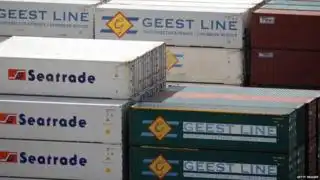 Image copyright Getty Images
Image copyright Getty Images
The post-Brexit customs system favoured by Boris Johnson and other leading Brexiteers could cost businesses up to £20bn, officials have suggested.
The chief executive of HM Revenue and Customs told MPs firms would have to pay £32.50 for each customs declaration under the so-called "max fac" solution.
John Thompson said any new system could take up to five years to fully work.
A "functioning border" was possible by the end of the transition period but he said it would not be "fully optimal".
The UK is leaving the EU in March 2019, which is currently expected to be followed by a 21 month transition phase before the longer term post-Brexit system kicks in.
Ministers are currently considering two options to replace the existing customs union with the EU, which involves minimal checks, and which the government is committed to leaving.
Brexiteers are sceptical about what is believed to be Theresa May's preferred option of a "customs partnership", under which the UK would collect tariffs set by the EU customs union on goods coming into the country.
Their proposed alternative "maximum facilitation" proposal would rely on technology and advance verification to minimise, rather than remove, customs checks.
The EU has expressed doubts about whether either option would work.
During questioning by the Treasury Select Committee, Mr Thompson stated that if ministers opted for the "max fac" solution this could cost business between £17bn and £20bn, reflecting the cost of customs declarations and complying with rules of origin requirements.
He said there were about 200 million exports to the EU each year that could require customs declarationsand a similar number of imports.
It would, he said, take between three to five years to fully implement any new system after Brexit but he suggested no new customs infrastructure would be needed in Northern Ireland.
Mr Thomson declined to answer when it was suggested it would be easier if the UK just remained in the customs uniona solution favoured by business but rejected by ministers.